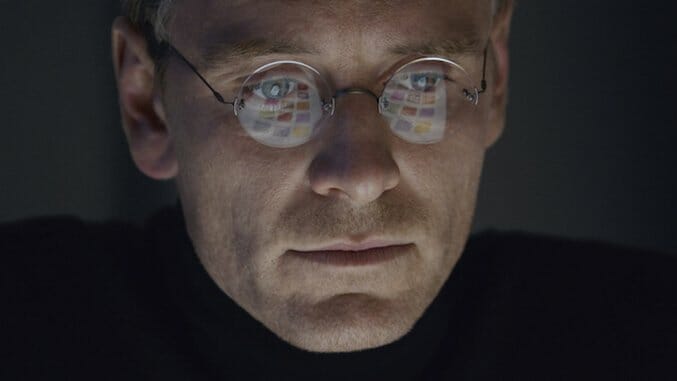Steve Jobs

And now, for your edutainment: 2015’s second movie about Apple visionary and all-around jerk, Steve Jobs, creatively titled Steve Jobs for sake of ease. The film marks Danny Boyle as the second person in 2015 to attempt at parsing out the many faces of the late Jobs, or maybe the third. Boyle has the director’s credit, but the heart driving the production is clearly that of screenwriter Aaron Sorkin. Sorkin’s stamp shapes the narrative here so much, in fact, that calling Steve Jobs a collaborative effort feels like a condescending pat on the head to Boyle, whom Sorkin appears to have teamed up with just so he can drive in the carpool lane. It’s a Boyle film where Boyle struggles to be relevant and fails.
Both men have unleashed their joint hat tip to Jobs a month after Alex Gibney bored us with Steve Jobs: The Man Inside the Machine, a lazily researched movie for the Wikipedia era of journalism. Steve Jobs, at least, cares enough to show us what we know instead of simply telling us, for whatever that’s worth. You don’t need to have read the damning reports on Jobs’ personal and professional practices, or seen Gibney’s documentary, to know that Jobs was a bad, bad man. The film sidesteps pedantry to erect a portrait of Jobs as a human being, as a genius, as an industry titan, and as the unapologetic schoolyard bully we all had to put up with at one point or another in our childhoods.
Structurally, Steve Jobs is an unmitigated success. If the film does anything well, it’s buck biopic conventions through shrewd narrative design: For two hours, it tells a fractured tale across three different periods of Jobs’ career, each of which revolves around a product launch. In 1984, it’s the Macintosh 128K. In 1988, it’s NeXT. In 1998, it’s the iMac, the Bondi blue gumdrop that revolutionized personal computing through the aughts. In each segment, Jobs (played by Michael Fassbender) contends with beseechment from his family as well as his friends and confidants, though for Jobs, “family,” “friends,” and “confidants” are roughly defined as “hangers on,” “distractions,” and “enemies.” To him, the people inhabiting his daily existence are hurdles on his quest to attain vaguely sketched catharsis rooted in his need for a strong father figure.
Deviating from the norm by breaking up the narrative into fragments is the smartest move Steve Jobs makes that doesn’t tie back to casting. Sorkin’s gift for zippy badinage is well known to anyone familiar with The West Wing, The Social Network, Sports Night and The Newsroom. Much like those projects, Steve Jobs has composed a cast of great actors ready to bring that writing to aural life. (Fassbender is joined by Kate Winslet as Joanna Hoffman, Jobs’ long-suffering marketing executive, a never-better Seth Rogen, as Apple co-founder and the company’s true comp-sci whiz kid, Steve Wozniak, and Jeff Daniels as John Sculley, the Apple CEO whose enduring legacy is his ousting of Jobs in 1988.)
-

-

-

-

-

-

-

-

-

-

-

-

-

-

-

-

-

-

-

-

-

-

-

-

-

-

-

-

-

-

-

-

-

-

-

-

-

-

-

-








































